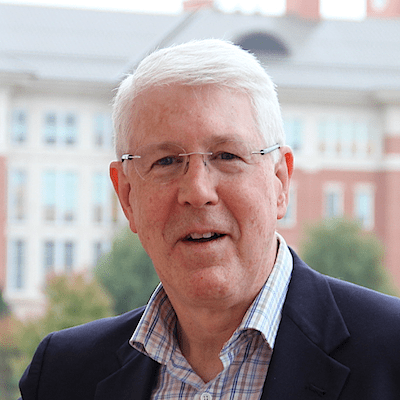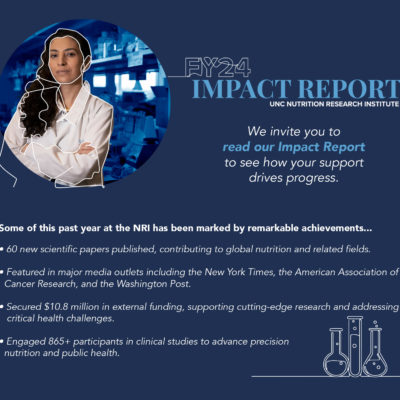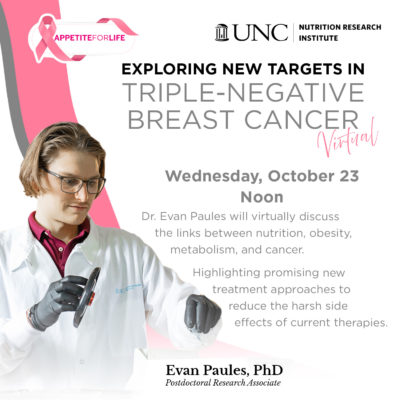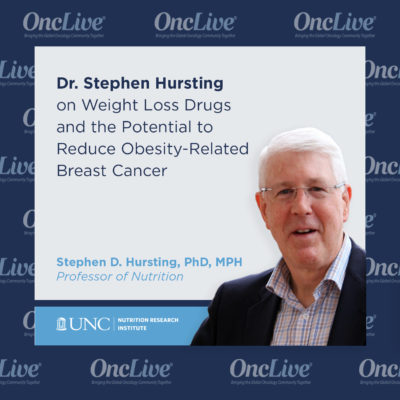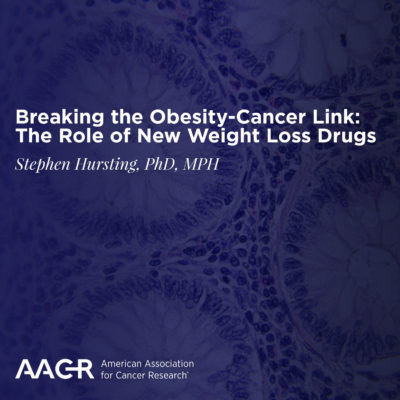Stephen D. Hursting, PhD, MPH
Professor of Nutrition
hursting@email.unc.edu
704-250-5059
View CV
Dr. Hursting is a Professor of Nutrition at the UNC Nutrition Research Institute in Kannapolis, NC. He is also Professor in the Department of Nutrition and the Lineberger Comprehensive Cancer Center at the University of North Carolina at Chapel Hill. An international leader in the area of nutrition, obesity, metabolism and cancer, his lab focuses on the molecular and metabolic mechanisms underlying obesity-cancer associations, and the impact of obesity- energy balance modulation (eg, calorie restriction and exercise) or pharmacologic agents on cancer development, progression, and responses to chemotherapy. Primarily using genetically engineered mouse models of breast cancer (recently in parallel with several clinical trials), colon cancer and pancreatic cancer, Dr. Hursting has identified the IGF1/Akt/mTOR and NF-kB signaling pathways as key targets for breaking the obesity-cancer link. His publications establish causal links between obesity, cancer and several systemic factors (including IGF-1, insulin, leptin and IL-6) and components of their downstream signaling pathways (including mTOR and NF-kb).
Prior to joining the UNC faculty in 2014, Dr. Hursting was Professor and Chair of the Department of Nutritional Sciences at the University of Texas (UT) at Austin, the McKean-Love Endowed Chair of Nutritional, Molecular and Cellular Sciences in the UT College of Natural Sciences, and Professor of Molecular Carcinogenesis at the UT-MD Anderson Cancer Center (2005-14). Dr. Hursting earned a BA in biology from Earlham College and a PhD in nutritional biochemistry and an MPH in nutritional epidemiology from the University of North Carolina at Chapel Hill. He also completed postdoctoral training in molecular biology and cancer prevention as a Cancer Prevention Fellow at the National Cancer Institute (NCI).
Show More

Elaine (Elle) Glenny, PhD
Research Associate, Hursting Lab - Chapel Hill
Elle completed her PhD at the University of North Carolina-Chapel Hill under the supervision of Dr. Ian Carroll where she investigated the consequences of severe calorie restriction on intestinal stem cell function and potential interactions of the gut microbiota. To further delineate dietary regulation of intestinal epithelial cell function, Elle has remained at UNC-Chapel Hill where she is now working with Drs. Stephen Hursting and Jatin Roper (Duke University) to investigate adipose-derived inflammatory factors that may drive colorectal tumor progression in obesity.

Evan Paules, PhD
Postdoctoral Research Associate, Hursting Lab
Evan Paules joined the NRI in August 2016 as a doctoral student under the mentorship of Dr. Zeisel. Following his graduation, Evan joined the lab of Dr. Hursting where he is now a postdoctoral researcher. Evan is currently investigating the determinants of heterogenic responses to dietary interventions in individuals. Evan attended Rider University where he graduated with a double major in Biochemistry and Behavioral Neuroscience. He was also a member of Rider University’s Division 1 swim team for all four years while he attended Rider.

Erika Rezeli
Lab Manager, Hursting Lab - Chapel Hill
Discover the NRI’s Impact: FY24 Report
Discover the Nutrition-Cancer Connection | Free Webinar
New Insights into Weight Loss Medications and Their Impact on Breast Cancer Risk
This article originally appeared on OncLive.com. Stephen Hursting, PhD, MPH, professor, Department of Nutrition, Lineberger Comprehensive Cancer Center, University of North Carolina (UNC) at Chapel Hill, and professor of nutrition, UNC Nutrition Research Institute,...
Annual American Association of Cancer Research (AACR) Special Session Features Stephen Hursting’s Cancer and Obesity Research
The annual American Association of Cancer Research (AACR) meeting took place April 5-10 in San Diego. It is the focal point of the cancer research community, where scientists, clinicians, other health care professionals, survivors, patients, and advocates gather to...
2022
2021
2020
2019
2018
2017
Obesity and Cancer Metabolism: A Perspective on Interacting Tumor-Intrinsic and Extrinsic Factors.
When less may be more: calorie restriction and response to cancer therapy.
Energy balance and obesity: what are the main drivers?
Metabolic Reprogramming by Folate Restriction Leads to a Less Aggressive Cancer Phenotype.

